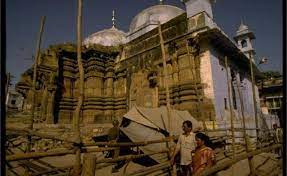
Gyanvapi Case: Muslim groups fear more cases of claims by Hindu groups over mosques
text_fieldsNew Delhi: The instances of the Hindu groups raising claims over more Muslim religious places can be expected ahead, said the Chief of All India Majlis-e-Ittehadul Muslimeen (AIMIM), Asaduddin Owaisi, responding to the Varanasi District court's ruling on a title suit related to Gyanvapi mosque.
In an interview given to NDTV, Owaisi said that the Varanasi District court's decision to hear the demand of four Hindu women that they are to be allowed to hold rituals inside the mosque premises throughout the year is likely to lead to a long legal battle as happened in the Babari Masjid case.
He lamented that the court's order was against his expectation that it would be dismissed at the first instance.
In the order, District judge AK Vishvesha found no merit in the contention of the Muslim petitioners that it would lead to instability, whereas the judge termed the Hindu women's petitions as "right of worship as a civil right, fundamental right as well as a customary and religious right."
The court also said that since the Hindu women were not asking for the conversion of the mosque premises, and the suit is limited and confined to seeking permission to hold rituals, there it has a weight to be heard in detail.
On the backdrop of a civil suit filed in a sessions court by the Hindu women seeking permission to conduct rituals, the Gyanvapi committee made a plea before the Supreme Court to quash the suit, whereupon the apex court transferred the case to a District court, saying it would like to hear the District court's ruling, considering the "complexity and sensitivity" of the dispute.
Owaisi views the District court order as contradicting the Places of Religious Worship Act 1991, which calls for the maintainability of the status quo of religious and worship places as it were on August 15, 1947, to end the disputes over places of worship.
The petitions filed by the Hindu women also argue that the 'Places of Religious Worship Act 1991' is a hurdle before the rights of Hindus, Jains, Buddhists, and Sikhs who want to restore their places of worship and pilgrimages" destroyed by invaders.
The Jamiat Ulama-i-Hind, who is also a party in the suit, argued that the court's decision to hear cases of such nature will bring more such cases into the courts, threatening the existence of countless mosques across the country.
The Supreme Court will take up the matter next on September 22 for written statement and framing of issues.























